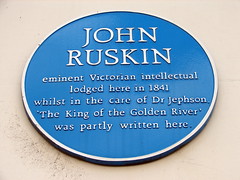John Ruskin


John Ruskin
(1819-1900)
man of letters, eminent Victorian intellectual, and Professor of Fine Art (1870-1878)
Commemorated on 4 plaques
John Ruskin 1819-1900 man of letters lived in a house on this site
26 Herne Hill, Lambeth, SE24, London, United Kingdom where they lived
John Ruskin eminent Victorian intellectual lodged here in 1841 whilst in the care of Dr Jephson. 'The King of the Golden River' was partly written here.
Russell Terrace, Royal Leamington Spa, United Kingdom where they lodged
John Ruskin, Slade Professor of Fine Art at the University of Oxford, mentioned this cottage and the beauty of its surroundings, when in 1874 he encouraged undergraduates to improve this road through the village & thus to "feel the pleasure of useful muscular work."
North Hinksey Village, Oxford, United Kingdom where they mentioned
In this house John Ruskin spent part of his boyhood. Born 1819. Died 1900.
10 Rose Terrace, Perth, United Kingdom where they lived

_Lived_in_a_house_on_this_site.jpg?width=250)


